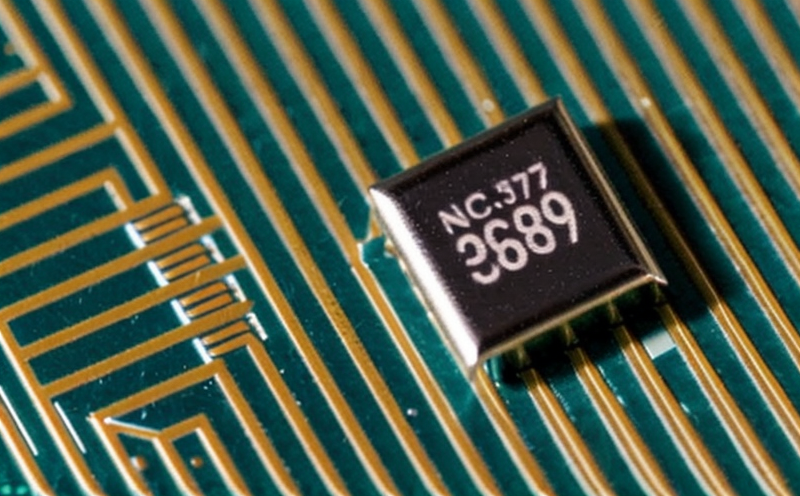JEDDEC JESD22-A130 Microchip Noise Susceptibility Testing
The JEDDEC JESD22-A130 Microchip Noise Susceptibility Test is an essential procedure designed to evaluate the robustness of semiconductor devices against electromagnetic interference (EMI) and noise susceptibility. This test ensures that microchips can withstand harsh operating environments, thereby enhancing product reliability and longevity.
The JESD22-A130 standard specifies a controlled exposure of the microchip to various types of noise and EMI fields. The primary goal is to identify potential vulnerabilities in the device’s design or manufacturing process that could lead to failure under real-world conditions. This testing method helps manufacturers adhere to stringent quality control measures, ensuring products meet both industry standards and customer expectations.
During this test, the microchip undergoes rigorous environmental simulations aimed at replicating actual operational scenarios. These include exposure to high-frequency electromagnetic fields, conducted and radiated noise, as well as voltage spikes and transients. The testing apparatus used typically consists of specialized chambers capable of generating controlled levels of these disturbances.
The acceptance criteria for JESD22-A130 are based on the integrity and functionality of the microchip post-testing. A successful outcome indicates that the device can operate reliably within specified noise environments without degradation in performance or failure. Compliance with this standard is crucial for ensuring product robustness, especially in industries where reliability is paramount.
By incorporating JESD22-A130 testing into their quality assurance protocols, companies not only enhance their products' market competitiveness but also demonstrate a commitment to delivering high-quality electronics that meet global regulatory requirements. This form of testing plays an integral role in safeguarding the integrity and performance of semiconductor devices across various applications.
In summary, JESD22-A130 is a critical step towards achieving superior product reliability by ensuring microchips can endure challenging electromagnetic environments without compromising their operational capabilities. Its implementation underscores a company's dedication to maintaining stringent quality standards throughout the entire production lifecycle.
Benefits
- Enhanced product reliability and longevity by identifying noise susceptibility early in the development process.
- Better compliance with industry standards, including JESD22-A130, ensuring regulatory adherence.
- Increased market competitiveness through superior product performance under challenging conditions.
- Potential reduction in warranty costs due to improved quality assurance and fewer field failures.
- Increased customer satisfaction by delivering dependable products that meet high reliability expectations.
Why Choose This Test
Selecting JESD22-A130 for microchip noise susceptibility testing offers several advantages. Firstly, it provides a comprehensive evaluation of the device's ability to withstand electromagnetic interference and noise, ensuring robust performance in real-world applications.
The test is particularly advantageous for industries where reliability and longevity are critical factors, such as automotive manufacturing, aerospace, medical electronics, and telecommunications. By subjecting microchips to controlled environmental stressors, manufacturers can identify potential weaknesses or design flaws that could lead to failures during actual use.
Compliance with JESD22-A130 not only enhances product reliability but also fosters trust among customers who value dependable electronic components. This aligns well with the broader goals of quality assurance and continuous improvement within these sectors.
In summary, choosing JESD22-A130 ensures that microchips meet stringent reliability standards, thereby contributing to safer, more efficient products across various industries. The test's ability to simulate real-world conditions makes it an invaluable tool for maintaining high-quality manufacturing practices.
Use Cases and Application Examples
The JESD22-A130 Microchip Noise Susceptibility Test finds extensive application across multiple sectors due to its focus on enhancing product reliability. Here are some prominent use cases:
- Aerospace Industry: Ensuring that microchips used in avionics and other critical systems can withstand the harsh electromagnetic environments encountered during flight.
- Automotive Sector: Evaluating microchips for automotive electronics to ensure they operate reliably under varying environmental conditions, including temperature extremes and noise interference.
- Medical Devices: Guaranteeing that life-saving medical equipment functions correctly despite electromagnetic disturbances in hospital settings.
- Telecommunications: Testing microchips used in communication infrastructure to ensure they perform optimally under noisy network conditions.
- Retail and Consumer Electronics: Ensuring the durability of consumer electronics like smartphones, tablets, and gaming consoles against electromagnetic interference.
These examples illustrate how JESD22-A130 testing plays a pivotal role in safeguarding critical electronic components across diverse industries. By adhering to this standard, manufacturers can significantly improve product reliability, ultimately leading to safer and more efficient devices.
Frequently Asked Questions
- Enhanced product reliability and longevity
- Better compliance with industry standards
- Increased market competitiveness by ensuring robust performance
- Potential reduction in warranty costs due to improved quality assurance
- Increased customer satisfaction through dependable products





